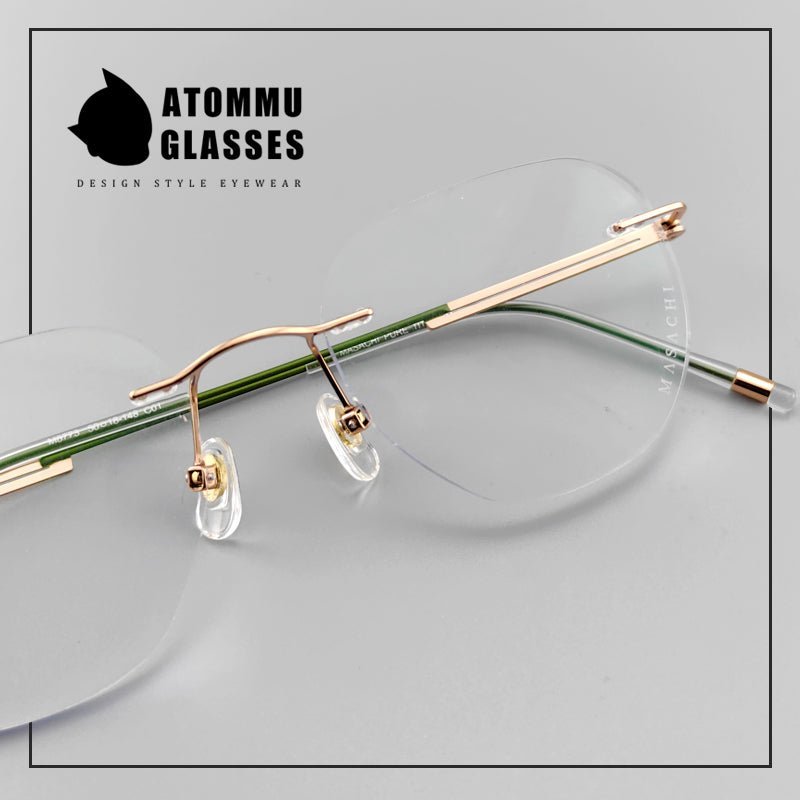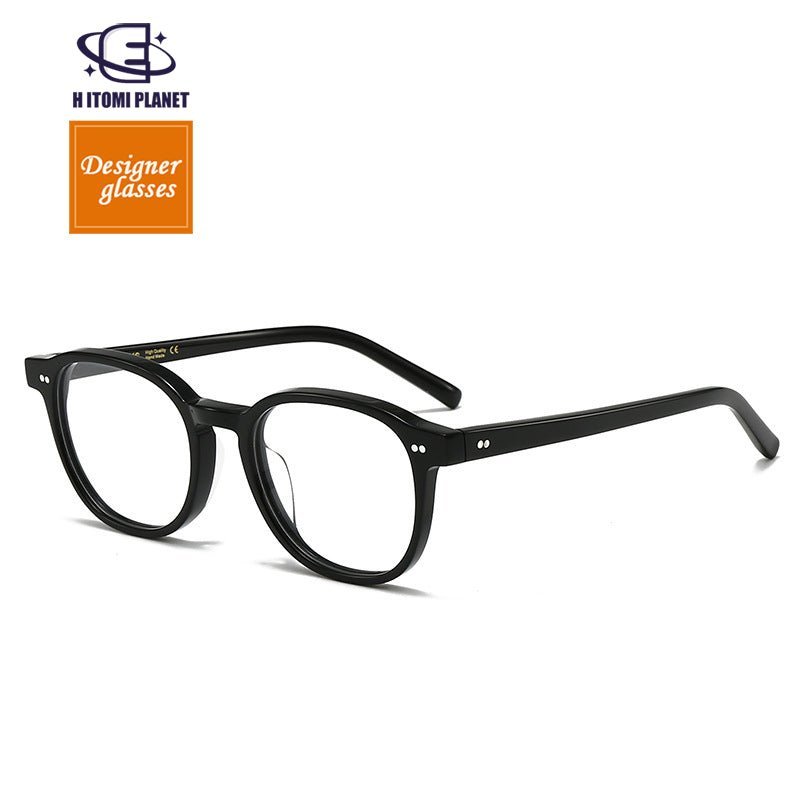
戴眼镜会加重近视吗?揭穿关于眼镜的常见误解
分享
近视困扰着全球数百万人。一个根深蒂固的误解是,戴眼镜——尤其是近视眼镜或光学眼镜——会加重近视。在本文中,我们将探讨相关的科学证据,澄清关于眼镜的常见误解,并介绍一系列兼具时尚感和舒适度的优质眼镜。
了解近视
近视是一种屈光不正,导致远处物体模糊,而近处物体清晰可见。这种情况是由于眼球相对于角膜和晶状体的聚焦能力过长,导致光线聚焦在视网膜前方而发生的。近视的发展可能受到遗传易感性和环境因素的影响,例如长时间近距离工作和自然光照射不足。
近视背后的科学
- 眼轴长度和屈光度:眼球拉长是近视发生的主要原因。研究表明,虽然某些因素可能导致眼轴拉长,但佩戴眼镜并不会导致眼轴进一步拉长。眼镜只是通过调整入射光线在视网膜上的焦点来矫正视力。
- 环境诱因:研究表明,环境因素,例如过多的屏幕时间和长时间近距离工作,会加剧儿童和青少年近视的进展。然而,一旦配戴合适的矫正镜片,这些镜片就不会加速潜在的生理过程。
- 矫正镜片说明:矫正镜片,包括处方近视眼镜和光学眼镜,旨在矫正屈光不正。其作用是确保眼睛接收聚焦的光线,从而缓解视力模糊,同时又不影响眼球的解剖结构。
关于眼镜的常见误解
误解一:戴眼镜会使视力下降
有些人认为,一旦开始戴眼镜,眼睛就会变得“懒惰”,导致视力进一步下降。然而,医学专家一致认为,眼镜仅仅是矫正现有屈光不正的工具。它们帮助大脑接收清晰的图像,并不影响眼睛的生物生长。
误解二:戴眼镜可以治疗近视
虽然理想的近视治疗方法是直接戴眼镜,但眼镜只能起到矫正作用。眼镜可以调整光线进入眼睛的方式,从而提供更清晰的视力。它们并不能阻止近视的加深,也无法从根本上改变眼球的形状。在很多情况下,尤其是在儿童中,即使佩戴了矫正镜片,近视仍会继续加深。
误解三:戴太多眼镜会导致眼睛疲劳
对于不习惯佩戴处方镜片的人来说,适应眼镜最初可能会引起轻微的眼疲劳或头痛。然而,这种适应期只是暂时的。随着眼睛逐渐适应正确的度数,眼疲劳通常会逐渐减轻,这证明了眼镜本身并不会加剧眼疲劳或长期加重近视。
科学视角:专家怎么说?
医学专家和同行评审研究一致表明,佩戴眼镜矫正视力不会加速近视的加深。相反,合适的处方眼镜能让用户更有效、更安全地完成日常任务。以下是一些专家对此的看法:
- 眼科医生的共识:眼科专家建议使用处方眼镜来确保正确的视力矫正,因为有证据表明,眼睛的物理属性(例如轴长)不会因佩戴眼镜而受到负面影响。
- 研究结果:多项研究得出结论,虽然环境和遗传因素在近视发展中起着一定作用,但佩戴眼镜与近视发展之间并无直接关联。事实上,眼镜有助于缓解眼疲劳,提高学习成绩,并改善整体生活质量。
- 近视管理策略:对于近视快速发展的儿童和青少年,眼科专家有时会建议采取额外的干预措施 - 例如角膜塑形术或低剂量阿托品眼药水 - 以减缓进展,同时通过矫正镜片保持清晰的视力。
眼镜是如何工作的?
眼镜,尤其是设计精良的光学眼镜,其工作原理是弯曲(折射)光线,使其正确地聚焦在视网膜上。以下是眼镜设计中关键部件的概述:
处方镜片
处方镜片是根据个人屈光不正情况定制的。它们有多种类型,包括针对近视的单焦点镜片,以及针对因年龄相关视力问题而出现其他问题的多焦点镜片。镜片的精确曲率是根据眼科检查时的测量结果定制的。
框架设计和材料
现代眼镜不仅仅是矫正视力的工具,更是彰显个人风格的必备时尚配饰。镜架的材质多种多样,例如:
- 金属(例如钛):因其耐用性和轻质特性而受到重视。
- 塑料:以其多功能性和丰富的颜色而闻名。
- 组合材料:这些材料兼具金属和塑料的优点,可根据佩戴者的需求量身定制。
人体工程学的作用
人体工程学设计对于现代光学眼镜至关重要。高品质眼镜的设计不仅能矫正视力,还能确保长时间佩戴的舒适性。可调节鼻托、轻巧镜框和灵活的铰链等设计,让佩戴者即使全天佩戴也不会感到不适或眼部疲劳。
戴眼镜会使近视加重吗?
根据数十年的研究和眼保健专业人士的共识,答案很简单:不会——戴眼镜不会加重近视。事实上,戴眼镜还有几个重要的好处:
视觉清晰,减少眼疲劳
眼镜可以矫正屈光不正,使人们拥有清晰锐利的视力。这对于阅读、驾驶和使用数码设备等工作至关重要。通过减少眼睛因视力模糊而过度补偿的需求,眼镜有助于降低眼疲劳和头痛的风险。
提高生活质量
无论成人还是儿童,清晰的视力对于日常活动都至关重要。佩戴合适的近视眼镜或光学眼镜,能够提升您在职场和社交场合的自信,提高学习成绩,并提升整体效率。合适的眼镜不仅不会造成伤害,反而能增进您的整体健康。
预防补偿行为
如果没有佩戴矫正镜片,人们可能会为了看得更清楚而无意识地眯起眼睛或向前倾。这会导致额外的眼疲劳以及颈部或肩部疼痛。戴上眼镜后,这些代偿行为就会被消除,从而促进更健康的姿势,并减轻整体身体压力。
近视管理的其他策略
虽然眼镜本身不会加重近视,但控制近视通常需要采取综合方法,包括改变生活方式,在某些情况下还需要进行其他治疗:
定期眼科检查
定期进行眼科检查可以确保您的度数始终准确。近视会逐渐加深,尤其是在年轻人中,因此定期检查可以及时调整您的眼镜度数。
户外活动
鼓励孩子多去户外活动有助于减缓近视加深。自然光和多样化的环境有助于促进眼睛的健康发育。
数字设备管理
减少屏幕时间并遵循 20-20-20 规则(每 20 分钟,看 20 英尺外的东西 20 秒)等准则可以帮助最大限度地减少数码眼疲劳,从而支持整体眼睛健康。
补充治疗
除了矫正镜片外,一些患者还可以从角膜塑形术(一种特殊设计的隐形眼镜,可以暂时重塑角膜)或验光师开出的低剂量阿托品滴眼液中受益,这有助于减缓近视的进展。
合适的眼镜质量的重要性
眼镜的质量至关重要。投资高品质的光学眼镜不仅能确保视力得到有效矫正,还能确保长期的眼部舒适度和时尚感。得益于镜片技术的进步,现代光学眼镜更轻便、更耐用、更美观。
推荐给现代专业人士的眼镜
对于那些希望将眼镜的风格与功能相结合的人来说,这里有一些因其设计、质量和性能而广受好评的顶级推荐。
无框系列
1. 设计师纯钛无框眼镜
产品描述:这款眼镜采用设计师纯钛镜框,坚固轻巧。精密切割的镜片、镂空镜腿,以及受鳄鱼皮风格启发的别致中世纪设计,散发出强大的专业气质,非常适合那些欣赏低调优雅和现代风格的人士。
产品链接: 设计师纯钛无框眼镜

2. 日本钛无框眼镜
产品描述:这款无框眼镜采用超轻日本纯钛材质,旨在带来极致舒适体验。可定制的镜片形状,让您轻松打造个人风格;简约的设计,更是日常长时间工作的理想之选。
产品链接: 日本钛合金无框眼镜

板材系列
复古日式MOS方形眼镜框
产品描述:这款镜架将复古日式设计与现代功能性完美融合。轻巧的ARTHUR防蓝光眼镜尤其适合高度数人士佩戴。它不仅能清晰矫正视力,时尚的方形镜框还能提升您的整体形象,非常适合长时间使用数码设备工作。
产品链接: 复古日系MOS方形眼镜框

拥抱眼镜创新
近年来,眼镜行业经历了重大创新。凭借纯钛等先进材料和创新设计技术,现代光学眼镜不仅能够提供卓越的视力矫正,还能彰显时尚魅力。无论您追求超轻无框眼镜还是坚固耐用的板材镜架,市场上都能提供满足各种生活方式和偏好的出色选择。
眼镜技术的未来
展望未来,镜片制造和数字集成技术的进步有望在舒适度、耐用性和视觉清晰度方面带来更大的提升。智能眼镜和增强现实 (AR) 等新兴技术将进一步彻底改变我们感知和与周围环境互动的方式,将矫正视力与增强的数字体验融为一体。
融合人体工程学和美学
现代眼部护理不仅仅是矫正视力,更在于确保您的眼镜与您的生活方式相得益彰。符合人体工学的设计,配备可调节功能和定制配件,确保您的眼镜无论长时间工作、通勤还是休闲娱乐,都能在舒适性和时尚感之间取得完美平衡。
结论:清晰的愿景,摒弃迷思
戴眼镜会加重近视的说法纯属无稽之谈。如果配戴的是最新度数且质量上乘的眼镜,就能提供最佳的视力矫正,最大程度地减轻眼疲劳,并促进整体眼部健康。这些品质在我们推荐的优质产品中得到了清晰的体现。
无论对于专业人士还是日常用户,投资一副优质的近视眼镜或光学眼镜意味着拥有清晰的视野、时尚的风格以及最佳的眼部护理。定期的眼科检查,结合生活方式的改变以及先进的矫正镜片,是有效管理近视的基础。最终,重点应该放在提升生活质量和视觉表现上,而不是加深人们对戴眼镜危害的误解。
无论您选择精致优雅的无框镜架(例如设计师纯钛无框眼镜或日本钛无框眼镜),还是选择永恒魅力和保护功能的板材镜架(例如复古日本 MOS 方形眼镜架),您的选择都是迈向更清晰的视野和更好的眼睛健康的一步。
揭穿这些常见的迷思,了解近视和眼镜设计背后的科学原理,让您能够自信地掌控自己的视力。选择优质的眼镜,定期检查,享受现代光学科技带来的好处。
















